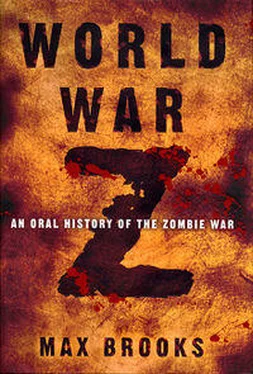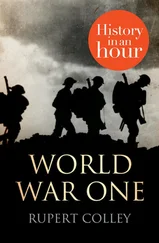By the time of the Great Panic, when the world finally woke up to the nightmare breaking down their doors, Cuba had already prepared itself for war.
The simple fact of geography spared us the danger of large-scale, over-land swarms. Our invaders came from the sea, specifically from an armada of boat people. Not only did they bring the contagion, as we have seen throughout the world, there were also those who believed in ruling their new homes as modern-day conquistadors.
Look at what happened in Iceland, a prewar paradise, so safe and secure they never found the need to maintain a standing army. What could they do when the American military withdrew? How could they stop the torrent of refugees from Europe and western Russia? Is it no mystery how that once idyllic arctic haven became a cauldron of frozen blood, and why, to this day, it is still the most heavily infested White Zone on the planet? That could have been us, easily, had it not been for the example set by our brothers in the smaller Windward and Leeward Islands.
Those men and women, from Anguilla to Trinidad, can proudly take their place as some of the greatest heroes of the war. They first eradicated multiple outbreaks along their archipelago, then, with barely a moment to catch their collective breaths, repelled not only seaborne zombies, but an endless flood of human invaders, too. They spilled their blood so that we did not have to. They forced our would-be latifundista to reconsider their plans for conquest, and realize that if a few civilians armed with nothing but small arms and machetes could defend their homelands so tenaciously, what would they find on the shores of a country armed with everything from main battle tanks to radar-guided antiship missiles?
Naturally, the inhabitants of the Lesser Antilles were not fighting for the best interests of the Cuban people, but their sacrifices did allow us the luxury of setting our own terms. Any seeking sanctuary would find themselves greeted with the saying so common among Norteamericano parents, “While under my roof, you will obey my rules.”
Not all of the refugees were Yankees; we had our share from mainland Latin America, from Africa, and western Europe, Spain especially-many Spaniards and Canadians had visited Cuba either on business or holiday. I had gotten to know a few of them before the war, nice people, polite, so different from the East Germans of my youth who used to toss handfuls of candy in the air and laugh while we children scrambled for it like rats.
The majority of our boat people, however, originated from the United States. Every day more would arrive, by large ship or private craft, even on homemade rafts that brought an ironic smile to our faces. So many of them, a total of five million, equal to almost half of our indigenous population, and along with all the other nationalities, they were placed under the jurisdiction of the government’s “Quarantine Resettlement Program.”
I would not go so far as to call the Resettlement Centers prison camps. They could not compare to the lives suffered by our political dissidents; the writers and teachers … I had a “friend” who was accused of being a homosexual. His stories from prison cannot compare to even the harshest Resettlement Center.
It was not easy living, however. These people, no matter what their pre-war occupation or status, were initially put to work as field hands, twelve to fourteen hours a day, growing vegetables in what had once been our state-run sugar plantations. At least the climate was on their side. The temperature was dropping, the skies were darkening. Mother Nature was kind to them. The guards, however, were not. “Be glad you’re alive,” they’d shout after each slap or kick. “Keep complaining and we’ll throw you to the zombies!”
Every camp had a rumor about the dreaded “zombie pits,” the hole in which they’d throw the “troublemakers.” The DGI (the General Intelligence Directorate)had even planted prisoners in the general population to spread stories about how they personally witnessed men being lowered, headfirst, into the boiling lake of ghouls. This was all just to keep everyone in line, you see, none of it was actually true… though… there were stories about the “Miami whites.” The majority of American Cubanos were welcomed home with open arms. I myself had several relatives living in Daytona who just barely escaped with their lives. The tears of so many reunions in those early, frantic days could have filled the Caribbean Sea. But that first wave of postrevolution immigrants-the affluent elite who had flourished under the old regime and who spent the rest of their lives trying to topple everything we’d worked so hard to build-as far as those aristos were concerned … I am not saying there is any proof that they were thrown to the ghouls by their fat, reactionary, Bacardi blanka drinking asses… But if they were, they can suck Batista’s balls in hell.
[A thin, satisfied smile crosses his lips.]
Of course, we couldn’t have actually attempted this kind of punishment with your people. Rumors and threats were one thing, but physical action… push a people, any people too far, and you risk the possibility of revolt. Five million Yankees, all rising in open revolution? Unthinkable. It already took too many troops to maintain the camps, and that was the initial success of the Yankee invasion of Cuba.
We simply didn’t have the manpower to guard five million detainees and almost four thousand kilometers of coastline. We couldn’t fight a war on two fronts. And so the decision was made to dissolve the centers and allow 10 percent of the Yankee detainees to work outside the wire on a spe-cialized parole program. These detainees would do the jobs Cubanos no longer wanted-day laborers, dish washers, and street cleaners-and while their wages would be next to nothing, their labor hours would go to a point system that allowed them to buy the freedom of other detainees.
It was an ingenious idea-some Florida Cubano came up with it-and the camps were drained in six months. At first the government tried to keep track of all of them, but that soon proved impossible. Within a year they had almost fully integrated, the “Nortecubanos,” insinuating themselves into every facet of our society.
Officially the camps had been created to contain the spread of “infection,” but that wasn’t the kind spread by the dead.
You couldn’t see this infection at first, not when we were still under siege. It was still behind closed doors, still spoken in whispers. Over the next several years what occurred was not so much a revolution as an evolution, an economic reform here, a legalized, privately owned newspaper there. People began to think more boldly, talk more boldly. Slowly, quietly, the seeds began to take root. I’m sure Fidel would have loved to bring his iron fist crashing down on our fledgling freedoms. Perhaps he might have, if world events had not shifted in our favor. It was when the world governments decided to go on the attack that everything changed forever.
Suddenly we became “the Arsenal of Victory.” We were the breadbasket, the manufacturing center, the training ground, and the springboard. We became the air hub for both North and South America, the great dry dock for ten thousand ships. We had money, lots of it, money that created an overnight middle class, and a thriving, capitalist economy that needed the refined skills and practical experience of the Nortecubanos.
We shared a bond I don’t think can ever be broken. We helped them reclaim their nation, and they helped us reclaim ours. They showed us the meaning of democracy… freedom, not just in vague, abstract terms, but on a very real, individually human level. Freedom isn’t just something you have for the sake of having, you have to want something else first and then want the freedom to fight for it. That was the lesson we learned from the Nortecubanos. They all had such grand dreams, and they’d lay down their lives for the freedom to make those dreams come true. Why else would El Jefe be so damned afraid of them?
Читать дальше












